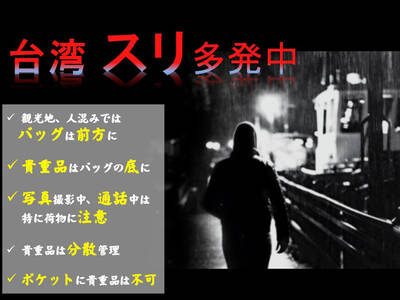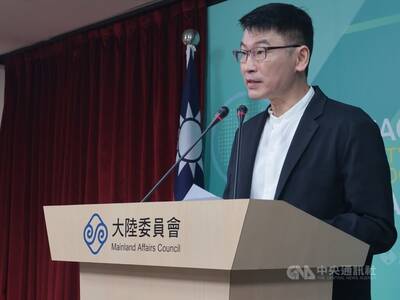Human-rights experts attending a conference held yesterday to mark Human Rights Day, which fell on Dec. 10, said that in order to transform Taiwan into a state that fully upholds human rights, a new constitution appropriate to Taiwan and government review over existing injustices is urgently needed.
Experts at the conference, held by the Taiwan New Century Foundation (
Chen Lung-chu (
However, Chen Shui-bian's efforts to establish a national human-rights committee and make the International Bill of Rights national law were both rejected by opposition parties in the legislature.
"Taiwan does need a new constitution. Advancing the levels of democracy and human-rights development in Taiwan relies on a collaborative partnership between the government and the people," Chen Lung-chu said.
Chen Lung-chu argued that Chen Shui-bian's two ideas regarding human-rights infrastructure-building for a human-rights respecting state and the people's right of initiative (
In addition to Taiwan's long-term unfamiliarity with international standards of human rights, experts said that, sadly, the nation's people had learned little about violence from their past misfortune and were often unaware of micro-levels of violence that are imposed by both society and the government.
According to Wu Hao-jen (
The "white terror" era began in the late 1940s, when the Republic of China regime, lead by the Chinese Nationalist Party (KMT), declared martial law and then enacted the Measures to Eradicate Espionage. Wu said that some "white terror" victims remain unable to reverse previous judgments, even after Martial Law was lifted in 1987.
"Some people whose human rights were jeopardized remain forgotten by political figures no matter which side of the political spectrum," said Wu, also an assistant professor of law at Fu Jen Catholic University.
Wu said one of the most prominent cases was the forced eviction of elderly leprosy patients from the Lo Sheng Sanatorium (
Wu said that over the past few years none of the candidates for county commissioner had even considered the patients, who have been abused simply because of their illness.
Since the 1930s, when Taiwan was still a Japanese colony, leprosy patients were "locked" in the sanatorium. Segregation ended in 1945, although the patients had nowhere else to go and chose to stay in the shelter.

The Japan-Taiwan Exchange Association has cautioned Japanese travelers to be vigilant against pickpockets at several popular tourist spots in Taiwan, including Taipei’s night markets, the Yongkang Street area, Zhongshan MRT Station, and Jiufen (九份) in New Taipei City. The advisory, titled “Recent Development of Concerns,” was posted on the association’s Web site under its safety and emergency report section. It urges travelers to keep backpacks fully zipped and carried in front, with valuables placed at the bottom of the bag. Visitors are advised to be especially mindful of their belongings when taking photos or speaking on the phone, avoid storing wallets and

ENDORSING TAIWAN: Honduran presidential candidate Nasry Afura said that Honduras was ‘100 times better off’ when it was allied with Taipei The Ministry of Foreign Affairs yesterday said it would explore the possibility of restoring diplomatic relations with Honduras based on the principle of maintaining national interests and dignity. The ministry made the remarks in response to reporters’ questions regarding an article titled: “Will Taiwan Regain a Diplomatic Ally?” published in The Diplomat on Saturday. The article said Honduras’ presidential election in November could offer Taiwan the chance to regain an ally, as multiple candidates have promoted re-establishing diplomatic relations with Taiwan. Honduras severed diplomatic ties with Taiwan in March 2023 in favor of Beijing, but since switching its diplomatic recognition,

Scoot announced yesterday that starting in October, it would increase flights between Taipei and Japan’s Narita airport and Hokkaido, and between Singapore and Taipei. The low-cost airline, a subsidiary of Singapore Airlines, also said it would launch flights to Chiang Rai in Thailand, Okinawa and Tokyo’s Haneda airport between December and March next year. Flights between Singapore and Chiang Rai would begin on Jan. 1, with five flights per week operated by an Embraer E190-E2 aircraft, Scoot said. Flights between Singapore and Okinawa would begin on Dec. 15, with three flights per week operated by Airbus A320 aircraft, the airline said. Services between Singapore

The Mainland Affairs Council (MAC) yesterday announced a ban on all current and former government officials from traveling to China to attend a military parade on Sept. 3, which Beijing is to hold to mark the 80th anniversary of the end of the Second Sino-Japanese War. "This year marks the 80th anniversary of the end of World War II and the Republic of China’s victory in the War of Resistance [Against Japan]," MAC Deputy Minister and spokesperson Liang Wen-chieh (梁文傑) told a regular news briefing in Taipei. To prevent Beijing from using the Sept. 3 military parade and related events for "united